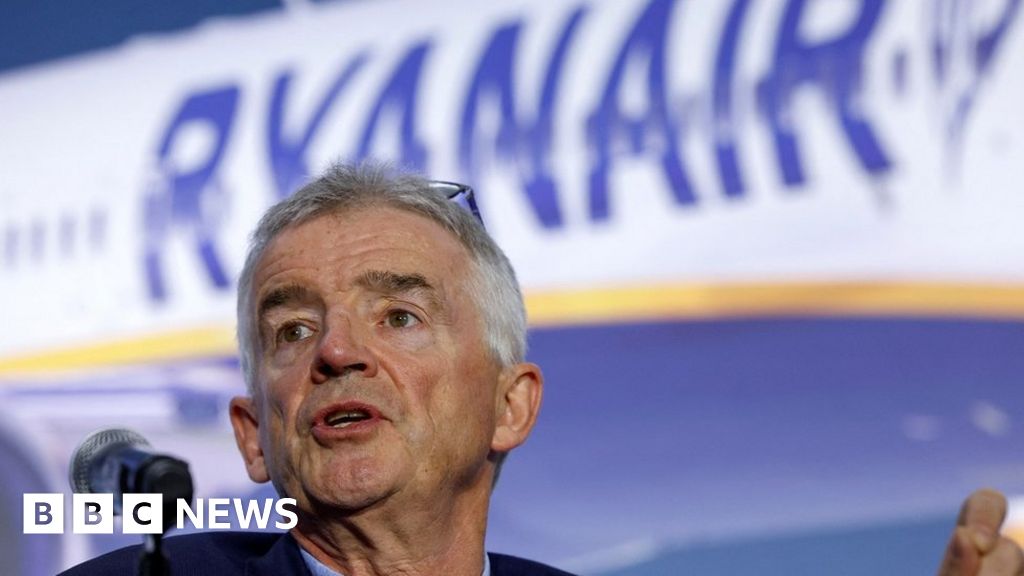Ryanair Says Air Traffic Failure Is Not Acceptable

Ryanair boss Michael O'Leary has said Monday's failure of the UK's air traffic system was "not acceptable".
He said the airline had still not received an explanation as to what caused the problems and questioned why there was no back-up system in place.
In a statement on X, formerly known as Twitter, he said Ryanair had to cancel about 250 flights on Monday affecting 40,000 passengers.
However, he said services were expected to return to normal by Wednesday.
More than a quarter of all UK flights were axed on Monday after a fault with National Air Traffic Services (Nats), which runs air traffic control in the UK.
Delays and cancellations have been continuing on Tuesday. The disruption on Monday has led to some planes and air crew being stuck in the wrong location, and has also caused problems with staff rotas.
According to aviation data firm Cirium, 790 departing flights were cancelled on Monday, which it said was equivalent to about a quarter of all departures, and 785, or about 27%, of incoming flights.
As all airlines flying in and out of the UK were affected, this meant carriers could not switch passengers to planes operated by other companies.
Mr O'Leary said Ryanair had been in contact with Nats.
"We still haven't had an explanation from them on what exactly caused this failure yesterday and where were their back up systems," he said.
"It's not acceptable that UK Nats simply allow computer systems to be taken down and everybody's flights get cancelled and delayed."
Meanwhile, Willie Walsh, director general of the International Air Transport Association and the former boss of British Airways, said: "Nats has crucial questions to answer about their responsibility for this fiasco.
"The failure of this essential service is unacceptable and brings into question the oversight of the Civil Aviation Authority (CAA) who are required to review the Nats resilience plan under the terms of its licence."
Mr O'Leary said that about 20 Ryanair aircraft had not been able to return to their home bases on Monday.
He added that about 70 flights were set to be cancelled on Tuesday out of the 3,200 planned, and said the carrier was doing "everything we possible can to minimise the disruption for our passengers and their families".
Nats confirmed there was a problem with the air traffic control system shortly after midday on Monday.
It announced later it had identified and remedied the issue, but warned it would take "some time for flights to return to normal".
However, it declined to comment on what had caused the issue.
On Tuesday, it apologised again, adding: "Our systems are operating as normal and we are working with the airlines and airports to get people where they need to go and clear the backlog as quickly as possible."
It added that "a thorough investigation is now underway to understand the root cause of what happened".
Michele Robson, who used to work in air traffic control, said airlines could be in line for some compensation for the delays.
"The airlines pay for Nats, they are charged a set rate," she told the BBC. "They (Nats) do have targets they have to meet… which relate to delays, so the outages of yesterday could mean some refunds for the airlines."
The government has said that it has been told that Monday's problems were not the result of a cyber-attack.
The prime minister's official spokesperson said: "The exact cause of the technical incident will be subject to the investigation by the Civil Aviation Authority and then submitted to government."
From Chip War To Cloud War: The Next Frontier In Global Tech Competition
The global chip war, characterized by intense competition among nations and corporations for supremacy in semiconductor ... Read more
The High Stakes Of Tech Regulation: Security Risks And Market Dynamics
The influence of tech giants in the global economy continues to grow, raising crucial questions about how to balance sec... Read more
The Tyranny Of Instagram Interiors: Why It's Time To Break Free From Algorithm-Driven Aesthetics
Instagram has become a dominant force in shaping interior design trends, offering a seemingly endless stream of inspirat... Read more
The Data Crunch In AI: Strategies For Sustainability
Exploring solutions to the imminent exhaustion of internet data for AI training.As the artificial intelligence (AI) indu... Read more
Google Abandons Four-Year Effort To Remove Cookies From Chrome Browser
After four years of dedicated effort, Google has decided to abandon its plan to remove third-party cookies from its Chro... Read more
LinkedIn Embraces AI And Gamification To Drive User Engagement And Revenue
In an effort to tackle slowing revenue growth and enhance user engagement, LinkedIn is turning to artificial intelligenc... Read more

